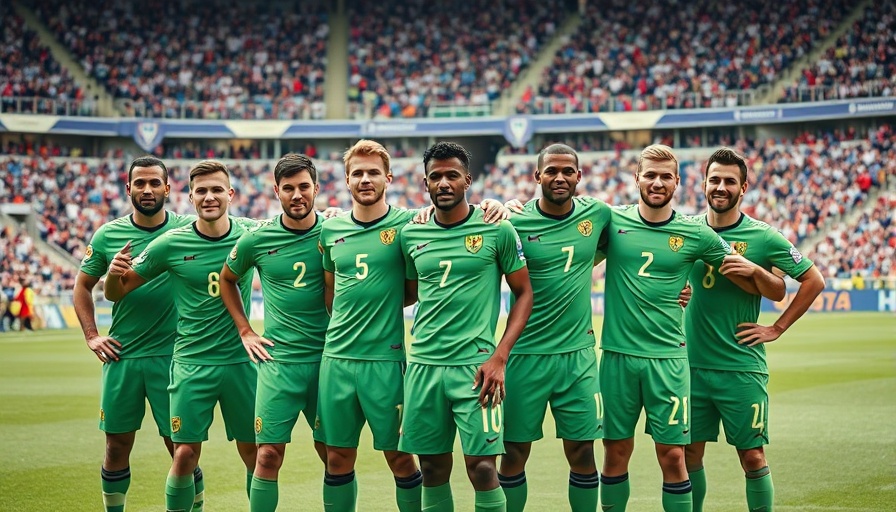
The Super Eagles' Road to Redemption: World Cup Qualifiers Ahead
The announcement of the Super Eagles’ provisional 31-man squad for the upcoming 2026 FIFA World Cup qualifiers, against Rwanda and South Africa, marks a significant moment in Nigerian football. Head coach Eric Chel, facing mounting pressure, has chosen a mix of seasoned players and fresh faces in hopes of turning the team’s fortunes around. The squad will converge in Wo, with high stakes looming as Nigeria trails South Africa in Group C.
In Super Eagles Squad Named for World Cup Qualifiers Against Rwanda and South Africa, the conversation delves into the challenges and opportunities facing Nigeria's football team as they navigate their crucial campaign.
Challenges in Squad Selection: A Coach's Dilemma
In any national team, the selection process can ignite fervent debates among fans and analysts alike. With dynamic players like Victor Osimhen and Alex Iwobi leading the charge, Eric Chel’s decisions will inevitably be scrutinized. Many question the rationale behind his choices, especially in a team where public sentiment can shift with unexpected results. Chel’s strategy hinges not just on talent, but on finding the right mix and balance that can steer Nigeria towards victory.
The Burden of Expectations: Will the Eagles Soar?
With the Super Eagles positioned fourth in their group, the pressure to perform in the upcoming fixtures cannot be overstated. Nigeria’s fanbase has traditionally held high expectations, often quantifying success through World Cup qualifications. Their upcoming matches against South Africa and Rwanda represent more than just games; they symbolize hope, disappointment, and national pride. The stakes couldn't be higher, as a failure to qualify could lead to severe ramifications both for the coach and the federation.
The State of Nigerian Football: Is Change Needed?
The ongoing discussions regarding Eric Chel’s capabilities as a coach have stirred up debates about the future of Nigerian football. Some fans advocate for a change in leadership, suggesting that a fresh perspective may reinvigorate the squad. Others argue that the foundation of Nigerian football needs strengthening: improving local leagues and nurturing talent from grassroots to professional levels. The latter lays out a pathway for sustainable success beyond immediate results.
Looking Beyond the World Cup: Building a Stronger Foundation
As the Super Eagles prepare for these crucial matches, the conversation must extend beyond short-term gains. The structural weaknesses highlighted by analysts emphasize the importance of a robust league system that nurtures home-based talents. A strong footballing foundation is crucial for nurturing future stars and ensuring that Nigeria remains competitive on the international stage. The immediate goal is qualification but laying the groundwork for success beyond the qualifiers is equally critical.
Psychological Impact: Managing Player Morale
The mental aspect of football cannot be overlooked, especially when navigating high-pressure scenarios. Players in the squad must manage expectations from fans while focusing on delivering tangible performance on the pitch. How players cope will influence not only individual performances but also team cohesion. Engaging with sports psychologists can provide the necessary support, ensuring that the mental fortitude matches the physical capabilities.
The Context of the Matches: A Fight Worth Fighting
As Nigeria approaches the qualifiers, the upcoming games stand as a beacon of hope. Whether it’s against South Africa’s formidable team or Rwanda’s rising stars, the Super Eagles must rise to the occasion. Analysts suggest that beyond playing for victory, the squad plays for national pride, identity, and the emotional connection with a passionate fanbase. A World Cup berth extends far beyond the pitch; it's about unity and aspiration for an entire nation.
Conclusion: The Future of Nigerian Football Awaits
The Super Eagles are at a critical juncture in their World Cup journey. Supporting the team through these challenging fixtures is essential while recognizing the broader implications for Nigerian football. As fans rally behind their squad, it is important to maintain a dialogue about the health of the league system and the tactical decisions being made. Positive change takes time and requires a unified effort from both the footballing community and the federation.
 Add Row
Add Row  Add
Add 


Write A Comment